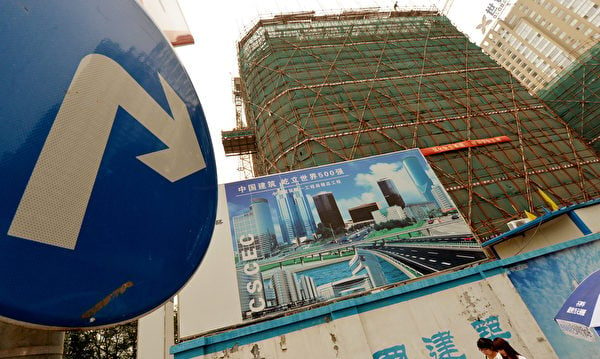[The Epoch Times, November 29, 2022](Interviewed and reported by Li Siqi, a reporter from the Epoch Times special department) The Central Bank of China officially announced the “Sixteen Financial Measures” on November 23 to boost the sluggish housing market. Real estate companies issued huge credit lines. However, professionals believe that credit is only on the supply side. If there is no change in the demand side, the housing market will hardly change from the downturn.
On November 23, the Central Bank of China officially released the “Sixteen Financial Measures” that have been widely circulated on its official website. The next day, the official website of the China Real Estate Association stated that on the day of the official announcement of the “Sixteen Financial Measures”, many banks granted huge amounts of credit to real estate companies. The so-called credit refers to the direct provision of funds by commercial banks to non-financial institution customers, or the guarantee made by customers for compensation and payment responsibilities that may arise in related economic activities.
According to the Chinese financial media “21st Century Finance and Economics”, on the second day of the official announcement, the credit lines provided by six large Chinese state-owned banks (Industrial and Commercial Bank of China, Agricultural Bank of China, Bank of China, Construction Bank, Bank of Communications and Postal Savings Bank) to real estate companies have been reduced. More than one trillion yuan (about 140 billion U.S. dollars).
For example, China Bank of Communications provided Vanke Group (000002.SZ) with an intentional comprehensive credit line of 100 billion yuan (about 14 billion U.S. dollars). At the same time, Vanke Group has also obtained an intentional credit line of no more than 100 billion yuan or equivalent foreign currency from the Bank of China, and signed a bank-enterprise strategic cooperation agreement with the Agricultural Bank of China. China Overseas Development (00688.HK), China Resources Land (01109.HK), Longfor Group (00960.HK) and Gemdale Group (600383.SH) also signed a bank-enterprise strategic cooperation agreement with the Agricultural Bank of China.
Mike Sun, an expert on investment strategies in North America and an expert on China issues, told The Epoch Times on November 26: “The fixed-point lending is mainly aimed at large private real estate companies, mainly Vanke, Country Garden and other leading real estate companies in mainland China with good performance.”
Country Garden (02007.HK) has not only obtained an intentional credit line of no more than 50 billion yuan (about 700 million U.S. dollars) from the Postal Savings Bank of China, but also signed contracts with the Industrial and Commercial Bank of China and the Bank of China. On November 24, Country Garden’s stock price rose by more than 20% in a single day. At the close on November 25, Country Garden’s share price was HK$3.1 (approximately US$0.4), an increase of approximately 31% from HK$2.36 (approximately US$0.3) at the close on the 23rd.
Mike Sun believes that the introduction of new policies to stimulate the real estate market “has a certain stimulating effect in the short term”, but for the real estate market, “look at the land resources in the medium term and the population in the long run”. He said that credit is only on the supply side. If the demand side does not change, sales will not go up. The current situation of the downturn in China’s housing market is difficult to change, and “the zero-clearing policy has a huge impact on the consumer side.”
The Statistics Bureau of the Communist Party of China released real estate sales data on November 15, saying that in the first 10 months of this year, the area of residential sales fell by 25.5% year-on-year, and the real estate development prosperity index continued to fall to 94.7 in October.
Taking Country Garden as an example, its unaudited operating data in October shows that the contracted sales amount in a single month in October was about 33.33 billion yuan (about 4.7 billion U.S. dollars), and the cumulative sales amount in the first 10 months was 309.43 billion yuan (about 4.7 billion U.S. dollars). About 43.3 billion U.S. dollars), a year-on-year decrease of 37.37%.
At the same time, the downturn in the real estate market has moved from non-first-tier cities to first-tier cities. In October, Shanghai’s second-hand housing transaction volume continued to fall, with a month-on-month decrease of 11%; Guangzhou’s second-hand housing transaction volume fell by 7.4% month-on-month. Although Shenzhen’s second-hand housing transaction volume in October was flat month-on-month, its second-hand housing transaction volume has fallen below 2,500 units for 15 consecutive months, and the sales volume of second-hand housing has exceeded 40,000 units in October.
The supply of second-hand housing in Beijing has also continued to increase, while the overall transaction volume in the first 10 months of this year has fallen sharply. According to data monitored by the China Index Research Institute, the number of second-hand housing transactions in Beijing in the first 10 months fell by 32.6% year-on-year, with Xicheng District seeing the largest year-on-year drop of 40.7%.
Responsible editor: Lian Shuhua#
